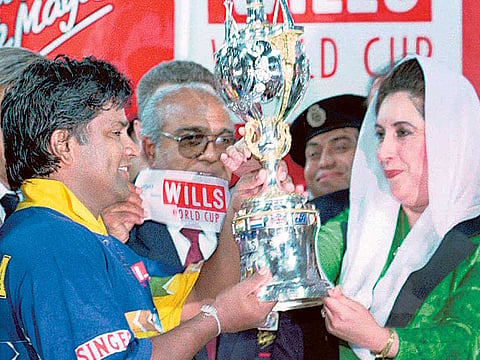Sri Lanka revolutionised cricket with 1996 triumph
Aravinda the hero in the final with three wickets and a century against Australia

Few would have given Sri Lanka any chance of winning the World Cup in 1996, despite the tournament returning to the subcontinent, with Pakistan India and Sri Lanka co-hosting. However, under the captaincy of Arjuna Ranatunga, the Lankans revolutionised the way the sport was played, especially in the first 15 overs.
Sanath Jayasuriya and his opening partner Romesh Kaluwitharana would give the side flying starts and then the middle order, with the experience of Aravinda De Silva, Ranatunga and Roshan Mahanama, would build on that foundation.
The tournament format was changed to two groups of six teams, with the top four teams progressing to the quarter-finals. The UAE, Holland and Kenya made their World Cup debuts.
The tournament began with Australia and the West Indies forfeiting their matches against Sri Lanka to be held in Colombo following a bombing.
With the help of a 79 by Jayasuriya and an unbeaten 70 by Hassan Tillakaratne, Sri Lanka beat India at New Delhi, despite a valiant 137 by Sachin Tendulkar, to qualify for the quarter-finals.
India, however, did manage to set up a repeat clash with Sri Lanka in the semis after showing Pakistan the door in Bangalore by 39 runs.
Brian Lara hit a brilliant 111 runs off just 94 balls in Karachi to give West Indies an exciting 19-run win over South Africa in their quarter-finals.
In the semi-final, India’s bowlers did what most couldn’t throughout the tournament — they cheaply dismissed Jayasuriya and Kaluwitharana. But Aravinda rose to the challenge with 66 as Sri Lanka posted 252 on a fast crumbling wicket.
India were on course with Tendulkar at the crease, but then, with the match slipping, the Kolkata crowd started throwing bottles on to the ground and rioting in the stands. The acts forced match referee Clive Lloyd to declare Sri Lanka the winners when India were reduced to 120 for eight.
The final belonged to Aravinda, who first took three wickets and two catches and then smashed an unbeaten 107 while chasing Australia’s 241. Asanka Gurusinha (65) and Ranatunga (47) gave him good support as the team took their first title in Lahore.
Tendulkar was the top run-scorer with 523, with Mark Waugh second on 484 including three centuries.


